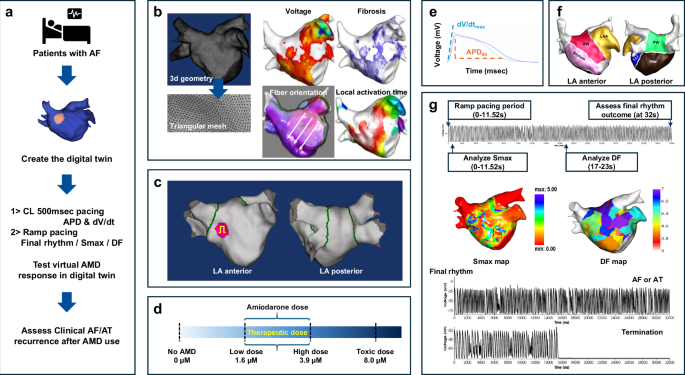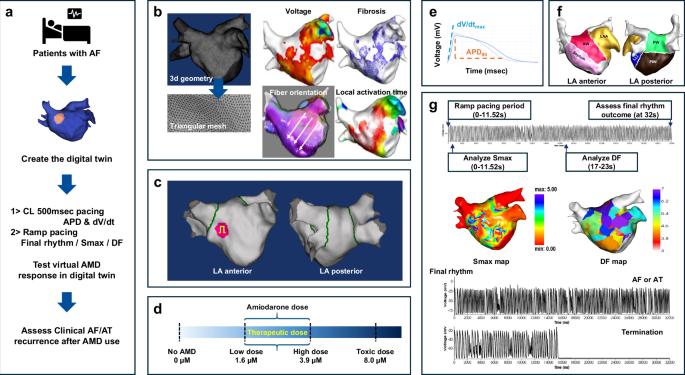Clinical usefulness of digital twin guided virtual amiodarone test in patients with atrial fibrillation ablation
IF 12.4
1区 医学
Q1 HEALTH CARE SCIENCES & SERVICES
引用次数: 0
Abstract
It would be clinically valuable if the efficacy of antiarrhythmic drugs could be simulated in advance. We developed a digital twin to predict amiodarone efficacy in high-risk atrial fibrillation (AF) patients post-ablation. Virtual left atrium models were created from computed tomography and electroanatomical maps to simulate AF and evaluate its response to varying amiodarone concentrations. As the amiodarone concentration increased in the virtual setting, action potential duration lengthened, peak upstroke velocities decreased, and virtual AF termination became more frequent. Patients were classified into effective (those with virtually terminated AF at therapeutic doses) and ineffective groups. The one-year clinical outcomes after AF ablation showed significantly better results in the effective group compared to the ineffective group, with AF recurrence rates of 20.8% vs. 45.1% (log-rank p = 0.031, adjusted hazard ratio, 0.37 [0.14-0.98]; p = 0.046). This study highlights the potential of a digital twin-guided approach in predicting amiodarone’s effectiveness and improving personalized AF management. Clinical Trial Registration Name: The Evaluation for Prognostic Factors After Catheter Ablation of Atrial Fibrillation: Cohort Study, Registration number: NCT02138695. The date of registration: 2014-05. URL: https://www.clinicaltrials.gov ; Unique identifier: NCT02138695.


数字孪生引导的虚拟胺碘酮测试在心房颤动消融患者中的临床实用性
如果能提前模拟抗心律失常药物的疗效,将非常有临床价值。我们开发了一种数字孪生系统,用于预测高危心房颤动(房颤)患者消融术后服用胺碘酮的疗效。我们通过计算机断层扫描和电解剖图创建了虚拟左心房模型,以模拟房颤并评估其对不同胺碘酮浓度的反应。随着虚拟设置中胺碘酮浓度的增加,动作电位持续时间延长,峰值上冲速度降低,虚拟房颤终止变得更加频繁。患者被分为有效组(在治疗剂量下房颤基本终止)和无效组。房颤消融术后一年的临床结果显示,有效组的效果明显优于无效组,房颤复发率分别为20.8%和45.1%(对数秩p = 0.031,调整后危险比为0.37 [0.14-0.98]; p = 0.046)。这项研究凸显了数字孪生引导方法在预测胺碘酮疗效和改善个性化房颤管理方面的潜力。临床试验注册名称:心房颤动导管消融术后预后因素评估:队列研究,注册号:NCT02138695:NCT02138695。注册日期:2014-05。网址:https://www.clinicaltrials.gov;唯一标识符:NCT02138695。
本文章由计算机程序翻译,如有差异,请以英文原文为准。
求助全文
约1分钟内获得全文
求助全文
来源期刊

NPJ Digital Medicine
Multiple-
CiteScore
25.10
自引率
3.30%
发文量
170
审稿时长
15 weeks
期刊介绍:
npj Digital Medicine is an online open-access journal that focuses on publishing peer-reviewed research in the field of digital medicine. The journal covers various aspects of digital medicine, including the application and implementation of digital and mobile technologies in clinical settings, virtual healthcare, and the use of artificial intelligence and informatics.
The primary goal of the journal is to support innovation and the advancement of healthcare through the integration of new digital and mobile technologies. When determining if a manuscript is suitable for publication, the journal considers four important criteria: novelty, clinical relevance, scientific rigor, and digital innovation.
 求助内容:
求助内容: 应助结果提醒方式:
应助结果提醒方式:


